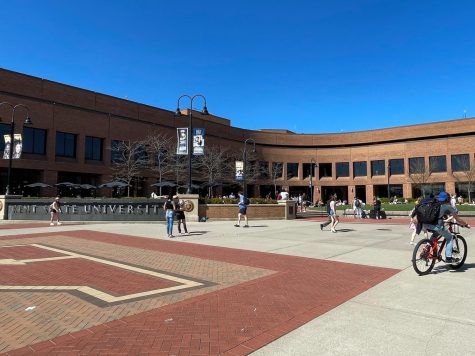EDITORIAL: Internet upgrade is unfunded mandate
October 25, 2005
Ever heard of the Communications Assistance for Law Enforcement Act? Well, according to the New York Times, the expansion of this piece of legislation from 1994 may end up costing American universities over $7 billion.
An order issued by the Federal Communications Commission and requested by the Department of Justice is requiring universities, communications companies and municipalities to reconfigure their Internet computer networks so they are more easily monitored by law enforcement agencies – a massive undertaking that could place further strains on many already cash-strapped colleges throughout the country. Because the government would have to be granted a court order to monitor Internet communications, most do not see the expansion of the law as a threat to civil liberties. However, many universities are increasingly concerned that the law will cause them to spend vast amounts of money on a project that will not do much to apprehend terrorists or other criminals.
Terry W. Hartle, a senior vice president of Lawyers for the American Council on Education, says that this “is the mother of all unfunded mandates.”
And so it seems to be. The law states that telephone carriers must configure their systems in such a way that federal agencies can easily access phone lines in order to conduct surveillance operations, and they must do so at their own cost. Now the DOJ wants to expand this to the Internet, which officials say is necessary to utilize communications technology to monitor the activities of terrorists and other criminals. And in a tricky sort of legal dine-and-dash, the DOJ is sticking colleges and universities with the bill.
Mechanisms are already in place to provide law enforcement agencies with access to Internet communications. But the federal government insists that universities use a more high-tech approach than the one used to this point, which will allow it even greater access.
“This is a fight over whether a Buick is good enough, or do you need a Lexus?” says Albert Gidari, Jr., a Seattle lawyer for Educause, a nonprofit organization of colleges and universities that plans on challenging the order. “The FBI is the lead agency, and they are insisting on the Lexus.”
And like most other bureaucratic strokes of genius, it is the man on the bottom – in this case, the students and their parents – who will feel the financial implications of this directive. According to Mr. Hartle, this mandate will require a tuition increase of some $450 at many universities.
While fighting crime and combating terrorism are certainly worthwhile goals, federal officials should be more considerate of the burdens they place on the people and organizations that will be impacted by the laws the most. Requiring colleges and universities, many of whom are already facing financial crisis, to pay for an upgrade that probably will not contribute significantly to homeland security efforts is unfair and should be reconsidered. The order does not seem to be of vital importance and the costs seem to far outweigh the benefits of implementing its provisions. Creating more financial problems for colleges and universities, as well as the students they serve, is certainly not an admirable cause for an agency which ostensibly claims to uphold the principles of justice.
The above editorial is the consensus opinion of the Daily Kent Stater editorial board.























